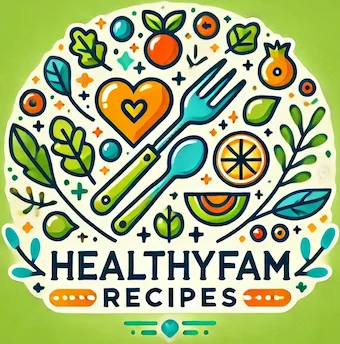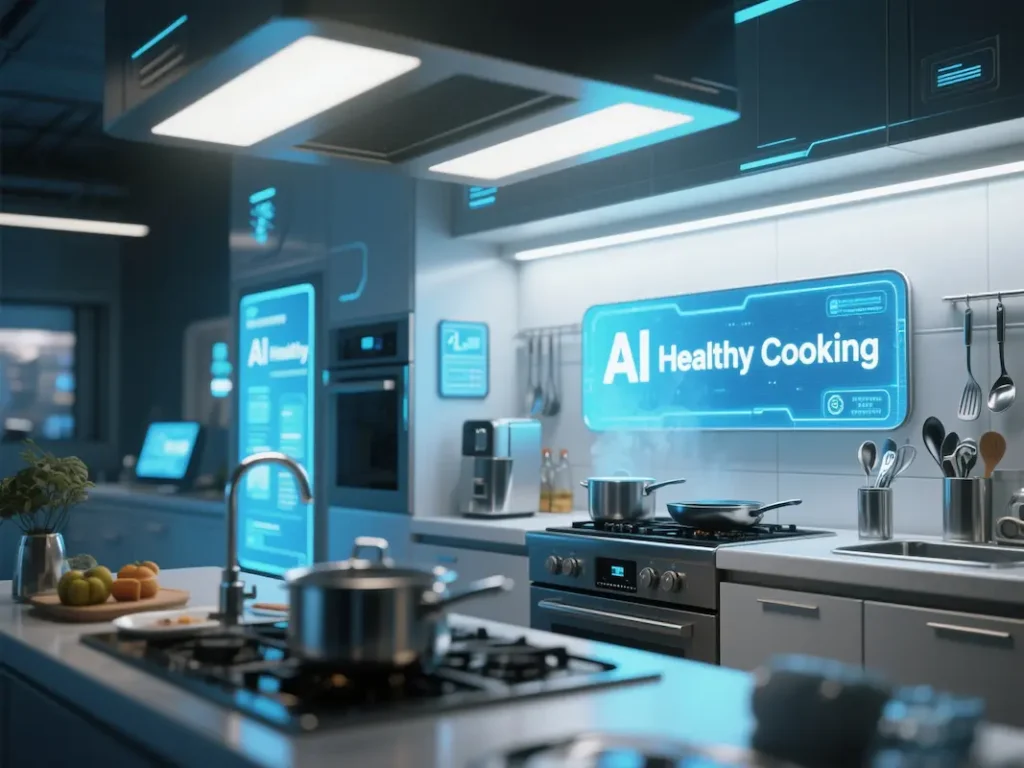
Table of Contents
HealthyFam—where quick meets nourishing!
What if your kitchen had a smart assistant that helped you eat healthier every day? Discover how AI Healthy Cooking is changing the way we shop, cook, and nourish our families—with 6 powerful tips to save time, reduce stress, and enjoy food that loves you back.
Technology is now sitting at our dinner tables. In U.S. kitchens, AI tools are moving beyond science fiction and into everyday life—helping busy parents meal plan, track nutrition, and even inspire kids to eat more veggies. Here’s how you can use AI smartly to make healthy family meals easier, faster, and better.
As a busy parent, you’re constantly juggling work, family time, and household responsibilities. Finding time to plan and prepare healthy meals can feel like an impossible task. But what if technology could lend a helping hand? AI healthy cooking is revolutionizing how families approach meal planning, nutrition, and kitchen efficiency. With artificial intelligence becoming more accessible than ever, you can now harness its power to create nutritious, delicious meals that your whole family will love – without the stress and time commitment that traditional meal planning often requires.
Why AI Healthy Cooking is Perfect for Busy Parents
Modern parenting comes with unique challenges that previous generations didn’t face. Between work commitments, school activities, and the constant need to provide nutritious meals, many parents find themselves overwhelmed. AI healthy cooking offers a practical solution by streamlining meal planning, suggesting recipes based on your family’s preferences and dietary needs, and even helping you make the most of ingredients you already have at home.
The beauty of using AI for healthy cooking lies in its ability to learn and adapt. Unlike static recipe books or generic meal plans, AI-powered cooking assistants can understand your family’s tastes, dietary restrictions, and schedule constraints. They can suggest quick 15-minute meals for hectic weeknights or elaborate weekend projects when you have more time to spend in the kitchen.
Understanding the Technology Behind AI Healthy Cooking
Before diving into practical tips, it’s helpful to understand how AI healthy cooking actually works. Modern cooking apps and platforms use machine learning algorithms to analyze vast databases of recipes, nutritional information, and user preferences. These systems can identify patterns in your cooking habits, recognize which ingredients pair well together, and even predict which recipes your family is most likely to enjoy.
Many AI cooking platforms also integrate with smart kitchen appliances, creating a seamless cooking experience. Your AI assistant might suggest adjusting oven temperatures based on your specific appliance, recommend cooking times that account for your altitude, or even send notifications to your phone when it’s time to flip that chicken breast.
Instead of googling substitutions, AI can instantly suggest healthier or cheaper swaps when your pantry is missing something.
Try This:
- ChatGPT plugins for recipes → Suggest almond flour instead of white flour, or Greek yogurt in place of sour cream.
- Grocery store apps like Kroger or Walmart+ → Some now have AI-driven “healthier swap” suggestions when you shop.
Food for Thought 
“Every time you let AI suggest a swap—beans instead of more expensive protein—you’re doing more than saving money. You’re teaching your kids flexibility in cooking, reducing food waste, and possibly improving gut health.”
Tip 1: Smart Meal Planning with AI Recipe Generators
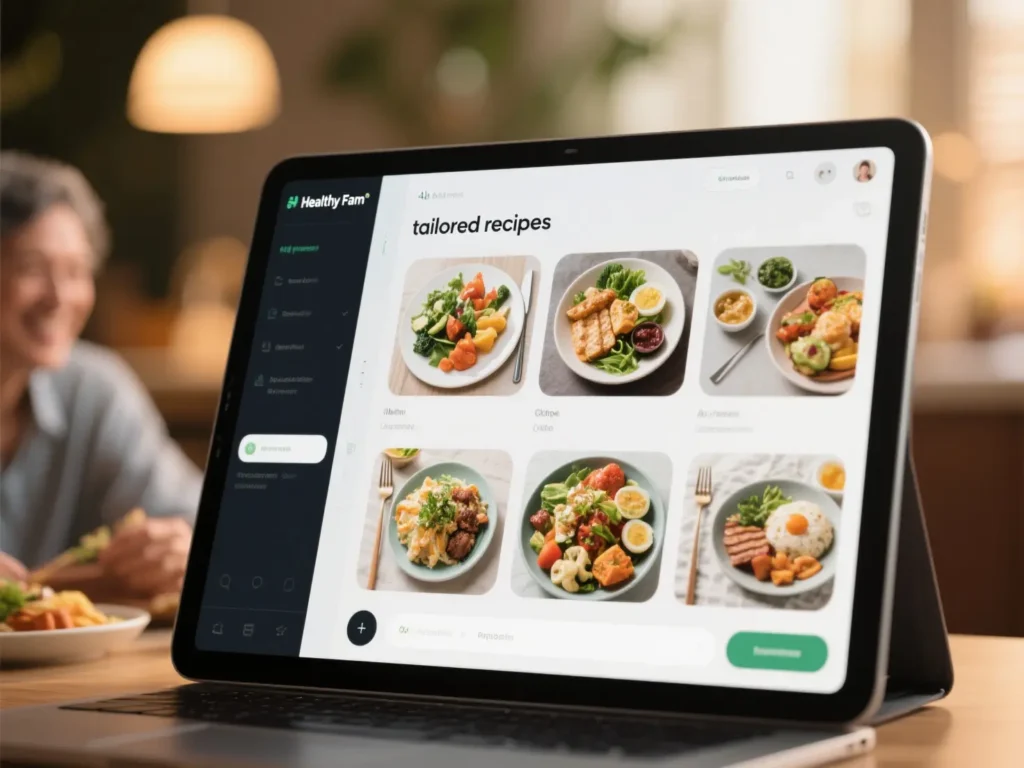
The foundation of AI healthy cooking starts with intelligent meal planning. Traditional meal planning often feels like a chore – you spend hours browsing recipes, making grocery lists, and trying to coordinate meals that use similar ingredients efficiently. AI changes this entirely.
Start by choosing an AI-powered meal planning app or platform that aligns with your family’s needs. Many of these tools allow you to input dietary preferences, allergies, cooking skill level, and time constraints. The AI then generates weekly meal plans that are perfectly tailored to your situation.
For example, if you tell the system that you have three kids who don’t like vegetables, work late on Tuesdays and Thursdays, and prefer Mediterranean flavors, it will create meal plans that account for all these factors. You might get suggestions for hidden vegetable pasta sauces, crockpot meals that cook while you’re at work, and Mediterranean-inspired dishes that are kid-friendly.
One of the most powerful features of AI meal planning is its ability to optimize for multiple goals simultaneously. You can prioritize nutrition while also considering budget constraints, prep time, and ingredient availability. The AI will balance these competing priorities and suggest meals that check all your boxes.
AI can generate personalized meal plans in seconds, adjusting for allergies, picky eaters, or family schedules.
Try These Tools:
- EatLove → Creates balanced meal plans and grocery lists tailored to your family’s health goals.
- Forks Over Knives Meal Planner → Focused on plant-based U.S. family diets.
- Whisk App → Imports recipes from anywhere and auto-creates shopping lists.
 Did you know? 63% of U.S. parents report stress over “what’s for dinner?” at least 3 times per week (Statista, 2024).
Did you know? 63% of U.S. parents report stress over “what’s for dinner?” at least 3 times per week (Statista, 2024).
Making the Most of AI Meal Planning
To maximize the benefits of AI meal planning, be specific about your preferences and constraints. The more information you provide, the better the recommendations will be. Don’t just say you want “healthy meals” – specify that you’re looking for high-protein options, low-sodium recipes, or meals rich in omega-3 fatty acids.
Also, don’t be afraid to provide feedback. Most AI systems learn from your responses, so rating recipes and providing comments about what worked (or didn’t work) helps the system improve its future recommendations.
📊 AI Cooking Apps: Free vs. Paid Comparison
| App / Tool | Free Plan Includes | Paid Plan Features | Price (USD) | Best For |
|---|---|---|---|---|
| MyFitnessPal | • Food & exercise logging • Basic calorie targets • Community forums | • Advanced macro tracking • Meal planner & grocery lists • No ads | $19.99/mo or $79.99/yr (Premium) $24.99/mo or $99.99/yr (Premium+) | Parents tracking weight loss, macros, or full meal plans |
| Cronometer | • Track 84+ nutrients • Verified food database • Sync with wearables | • Advanced reports & charts • Custom biometrics & fasting timer • No ads | $9.99/mo or $54.99/yr (Gold) | Families wanting accurate micronutrient tracking |
| Yummly | • Millions of free recipes • Save recipes & grocery lists • Basic nutrition info | • Premium recipes & videos • Smart meal planning • Ingredient recognition camera | $4.99/mo or $35.99/yr (Pro) | Busy parents who want quick meal inspiration |
| Spoonacular API | • Limited free recipe/nutrition API requests | • Higher request volume • Richer metadata & support | From $29/mo | Developers building custom recipe/meal apps |
Tip 2: Intelligent Ingredient Substitution and Optimization
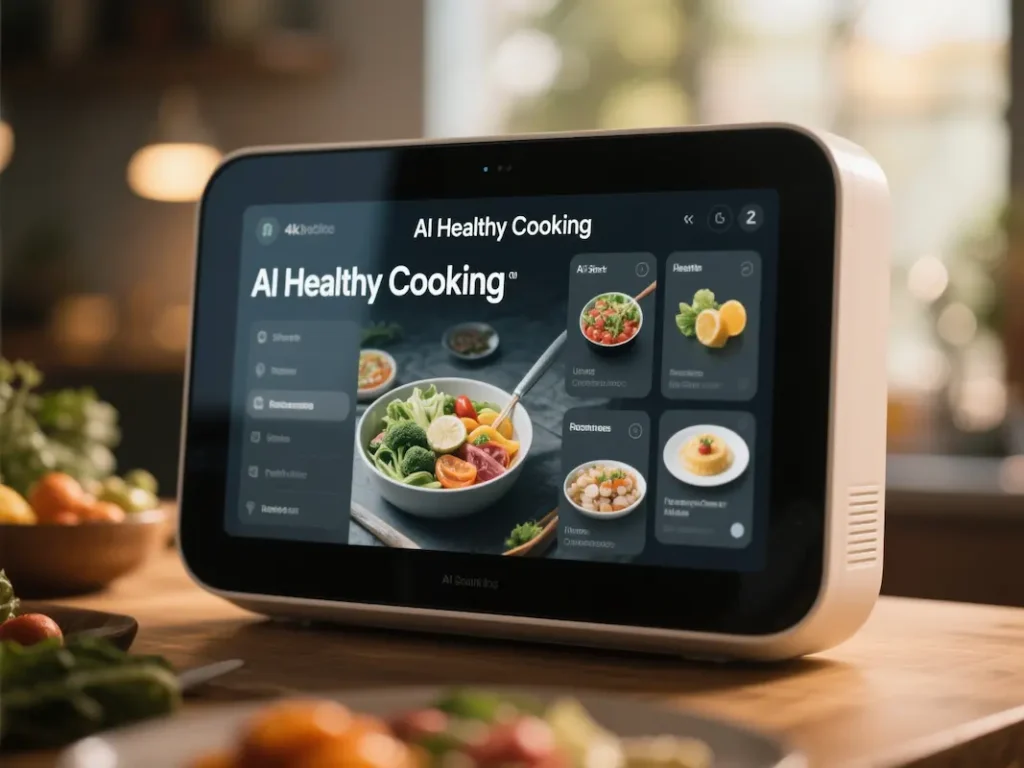
One of the most frustrating aspects of cooking is discovering you’re missing a key ingredient halfway through recipe preparation. AI healthy cooking tools excel at solving this problem through intelligent ingredient substitution. These systems understand the functional role of each ingredient in a recipe and can suggest appropriate substitutions that maintain both flavor and nutritional value.
Modern AI cooking assistants can analyze your pantry (either through manual input or even photo recognition) and suggest recipes based on what you actually have available. More impressively, they can modify existing recipes to work with your available ingredients while maintaining nutritional balance.
For busy parents, this feature is particularly valuable when trying to reduce food waste. Instead of throwing away that half-bunch of cilantro or those three remaining carrots, your AI assistant can suggest ways to incorporate them into tonight’s dinner while ensuring the meal remains balanced and nutritious.
The optimization capabilities extend beyond simple substitutions. AI can suggest ingredient swaps that improve the nutritional profile of your meals. For instance, it might recommend using Greek yogurt instead of sour cream, or suggest adding spinach to a smoothie for extra iron and vitamins without significantly changing the taste.
Practical Application of Ingredient Intelligence
Start by taking inventory of your pantry, refrigerator, and freezer. Many AI cooking apps allow you to photograph your ingredients or scan barcodes to quickly build a digital inventory. Once the system knows what you have available, it can suggest complete meals using primarily ingredients you already own.
This approach not only saves money but also reduces the frequency of grocery shopping trips – a huge time-saver for busy families. When you do need to shop, the AI can optimize your grocery list to ensure you’re buying ingredients that work across multiple planned meals.
Tip 3: Personalized Nutrition Tracking and Analysis

Understanding your family’s nutritional needs can be overwhelming, especially with constantly changing dietary guidelines and conflicting health information. AI healthy cooking platforms can demystify nutrition by providing personalized analysis and recommendations based on your family’s specific needs.
These systems can track macro and micronutrients across all your meals, identifying potential deficiencies or excesses in your family’s diet. Unlike generic nutrition advice, AI can account for individual factors like age, activity level, health conditions, and personal goals.
For parents dealing with picky eaters, AI nutrition tracking is particularly valuable. The system can help you identify creative ways to ensure your children are getting essential nutrients, even if they refuse to eat traditional “healthy” foods. It might suggest nutrient-dense smoothies, hidden vegetable recipes, or fun cooking projects that naturally incorporate important vitamins and minerals.
Many AI nutrition platforms also provide educational information, explaining why certain nutrients are important and how deficiencies might affect energy levels, mood, or overall health. This knowledge empowers you to make informed decisions about your family’s meals.
Instead of tracking calories by hand, AI apps scan barcodes, estimate portion sizes, and highlight nutrient gaps.
Try These Tools:
- MyFitnessPal (AI upgrade) → Suggests healthier meal choices in real time.
- Nutrino → Syncs with wearables like Apple Watch to give personalized feedback.
- Cronometer → Precise micronutrient analysis for parents who want details.
 Fact Check: Studies show AI diet tracking can improve adherence to weight-loss and healthy eating goals by up to 30% (Journal of Medical Internet Research, 2023).
Fact Check: Studies show AI diet tracking can improve adherence to weight-loss and healthy eating goals by up to 30% (Journal of Medical Internet Research, 2023).
Building Nutritional Awareness
Start by setting up family profiles that include basic health information, activity levels, and any specific nutritional goals or restrictions. The AI can then provide targeted suggestions for improving your family’s overall nutrition.
Pay attention to the patterns the AI identifies. You might discover that your family consistently falls short on certain nutrients or that specific meals tend to be higher in sodium than you realized. This information helps you make targeted improvements rather than attempting broad dietary overhauls that are difficult to maintain.
Tip 4: Time-Efficient Cooking with AI Kitchen Assistants
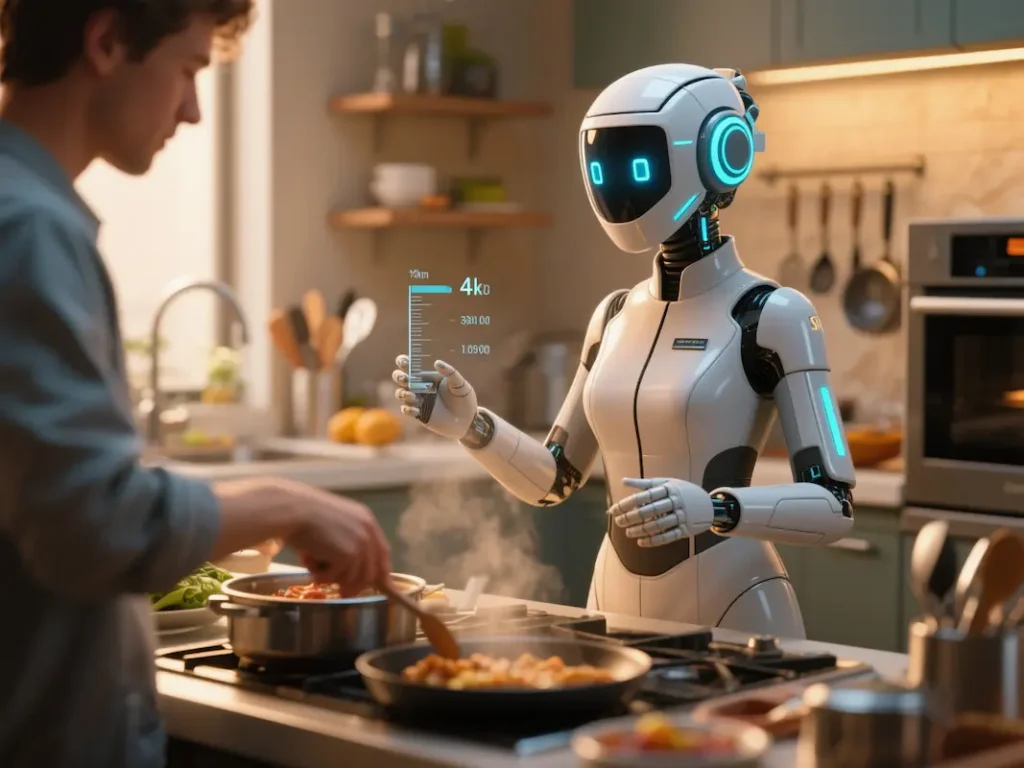
Time management is perhaps the biggest challenge in AI healthy cooking for busy parents. AI kitchen assistants excel at optimizing cooking processes, suggesting time-saving techniques, and coordinating multiple dishes to maximize efficiency.
These intelligent systems can analyze recipes and suggest prep work that can be done in advance, recommend cooking methods that require less active monitoring, and even coordinate timing so that all components of a meal finish simultaneously.
Voice-activated AI assistants are particularly valuable in the kitchen, allowing you to access recipes, set timers, and get cooking advice without stopping to look at your phone or tablet. This hands-free approach is safer and more efficient, especially when you’re managing multiple cooking tasks simultaneously.
Some advanced AI cooking systems can even integrate with smart appliances, automatically adjusting temperatures and cooking times based on the specific recipe and your equipment. This integration reduces the mental load of cooking, allowing you to focus on other tasks or spend time with your family while dinner prepares itself.
AI assistants can reduce the time spent cooking. From adjusting oven temps to suggesting recipes with ingredients you already own, the time savings add up.
Examples:
- Samsung SmartThings Cooking → AI guides oven cooking and meal suggestions.
- Innit App → Walks you through recipes step by step, hands-free.
Maximizing Kitchen Efficiency
Begin by identifying your biggest time constraints and pain points in the kitchen. Are you struggling with meal prep, cooking coordination, or cleanup? Different AI tools excel at different aspects of kitchen efficiency, so choose solutions that address your specific challenges.
Consider investing in a few smart kitchen appliances that can communicate with your AI assistant. Smart pressure cookers, ovens, and even refrigerators can significantly streamline your cooking process when properly integrated with AI systems.
Tip 5: Building Healthy Eating Habits Through Gamification
AI healthy cooking platforms increasingly incorporate gamification elements that make healthy eating more engaging for the whole family. These systems can track progress toward nutritional goals, award points for trying new healthy recipes, and even create family challenges around cooking and eating well.
For families with children, gamification can be particularly effective at encouraging healthy eating habits. AI systems can create personalized challenges like “try five new vegetables this month” or “cook together as a family three times this week.” These challenges are tailored to your family’s current habits and gradually encourage positive changes.
Many platforms also include social features, allowing you to connect with other families, share recipes, and participate in community challenges. This social aspect provides motivation and accountability while building a support network of like-minded parents.
The key to successful gamification is setting achievable goals that gradually build toward larger objectives. AI excels at this by analyzing your current habits and suggesting small, manageable changes that compound over time.
Turn picky eating into play. Many U.S. parents find that kids eat better when meals are interactive.
Try This:
- Yummly’s “Kids Mode” recipes → Involve kids in cooking.
- AI gamified apps like FoodNMe → Teach kids about healthy foods through games.
Engaging Your Family in Healthy Cooking
Start by involving your children in setting family nutrition and cooking goals. AI platforms can help translate these goals into age-appropriate challenges and activities. For younger children, this might involve identifying different colored vegetables or learning basic kitchen safety. Older children can participate in meal planning and even lead cooking projects.
Use the social features of AI cooking platforms to connect with other families. Sharing experiences, recipes, and challenges creates a sense of community and provides additional motivation to maintain healthy eating habits.
Tip 6: Cost-Effective Shopping and Meal Planning
Budget concerns often prevent families from maintaining consistently healthy eating habits. AI healthy cooking can address this challenge by optimizing meal plans for both nutrition and cost-effectiveness. These systems can analyze local grocery store prices, suggest seasonal ingredients, and recommend bulk purchasing strategies.
AI shopping assistants can track price trends and alert you to sales on ingredients you frequently use. Some platforms even integrate with grocery store loyalty programs and digital coupons, automatically applying discounts to your planned purchases.
The systems excel at reducing food waste by suggesting recipes that use similar ingredients and providing storage tips to extend ingredient freshness. They can also calculate the true cost per serving of homemade meals versus restaurant or convenience food alternatives, often revealing significant savings from home cooking.
For families on tight budgets, AI can suggest nutritious meals built around inexpensive staple ingredients like beans, lentils, eggs, and seasonal vegetables. The key is maximizing nutritional value while minimizing cost – something AI systems are uniquely equipped to optimize.
With grocery prices up nearly 21% since 2020 (USDA, 2024), AI can help families save by comparing store prices or optimizing meal plans around seasonal produce.
Try These Tools:
- Flipp App → AI compares weekly U.S. grocery ads for the cheapest deals.
- Mealime Pro → Plans meals based on budget and preferred stores.
- Instacart AI → Suggests cheaper or healthier cart swaps.
Smart Shopping Strategies
Begin by setting a realistic weekly or monthly food budget within your AI cooking platform. The system can then suggest meal plans that fit within this constraint while maintaining nutritional goals.
Take advantage of seasonal eating suggestions from your AI assistant. Seasonal ingredients are typically more affordable and often more nutritious than out-of-season alternatives. The AI can help you discover new recipes that highlight seasonal produce.
Advanced AI Healthy Cooking Strategies
As you become more comfortable with basic AI healthy cooking concepts, you can explore more advanced strategies. These might include using AI to plan meals around your family’s biorhythms (suggesting energizing breakfasts before busy days or calming dinners before bedtime), coordinating nutrition with fitness goals, or even using AI to help manage specific health conditions through diet.
Some families use AI to create themed weeks or months, exploring cuisines from different cultures while maintaining nutritional balance. The AI can suggest authentic recipes that are adapted for local ingredient availability and family preferences.
Advanced users might also explore AI-powered kitchen automation, where smart appliances work together to prepare complex meals with minimal human intervention. While this level of automation isn’t necessary for everyone, it represents the cutting edge of what’s possible with AI healthy cooking.
If You Keep Eating This Way for a Year…
- Brain: Improved focus & reduced stress thanks to balanced nutrition.
- Heart: Lower risk of high blood pressure with reduced processed foods.
- Gut: Healthier microbiome with more fiber-rich meals.
- Energy: Stable blood sugar leading to fewer afternoon crashes.
Common Challenges and Solutions in AI Healthy Cooking
Despite its benefits, AI healthy cooking isn’t without challenges. Some parents worry about over-reliance on technology or losing traditional cooking skills. The key is finding balance – using AI as a helpful tool while still developing fundamental cooking knowledge and intuition.
Privacy concerns are also common, as many AI cooking platforms collect data about eating habits and preferences. Choose platforms with transparent privacy policies and consider what information you’re comfortable sharing.
Technical issues can occasionally arise, from app glitches to smart appliance connectivity problems. Having backup plans and maintaining some traditional cooking resources ensures you’re never completely dependent on technology.
Cost can also be a barrier, as some advanced AI cooking platforms require subscription fees, and smart appliances represent significant upfront investments. Start with free or low-cost options to determine which features provide the most value for your family before investing in premium solutions.
The Future of AI Healthy Cooking for Families
The field of AI healthy cooking is rapidly evolving, with new capabilities and features being developed constantly. Future developments might include more sophisticated health monitoring integration, improved voice recognition that can understand multiple family members, and even more personalized nutrition recommendations based on genetic information.
Virtual reality cooking instruction, augmented reality recipe overlays, and advanced meal planning that accounts for family schedules and activities are all on the horizon. These developments promise to make healthy cooking even more accessible and convenient for busy families.
As AI technology becomes more sophisticated, we can expect even better integration between different platforms and devices, creating seamless cooking ecosystems that support healthy eating habits throughout your daily routine.
If You Don’t Use These Healthy AI Hacks…
- You’ll likely waste more food (the average U.S. family wastes $1,500/year).
- You may fall into repetitive meals that lack key nutrients.
- Grocery spending may climb without optimization.
- Kids may resist healthier changes without fun, interactive ideas.
Frequently Asked Questions About AI Healthy Cooking
Q: How accurate are AI nutrition recommendations compared to consulting with a registered dietitian?
A: AI healthy cooking platforms provide valuable nutritional guidance based on established dietary guidelines and research, but they shouldn’t replace professional medical or nutritional advice. For families with specific health conditions or complex dietary needs, AI tools work best as supplements to professional consultations rather than replacements. The AI can help implement recommendations from healthcare providers and track progress toward nutritional goals.
Q: What’s the learning curve like for families new to AI healthy cooking technology?
A: Most modern AI cooking platforms are designed to be user-friendly, with many families seeing benefits within the first week of use. The systems typically start with basic meal suggestions and gradually become more sophisticated as they learn your preferences. Children often adapt to the technology quickly and can even help teach parents how to use various features. Starting with one platform and gradually expanding your use of AI tools tends to be more successful than trying to implement multiple systems simultaneously.
Q: How do AI cooking systems handle food allergies and dietary restrictions?
A: AI healthy cooking platforms excel at managing food allergies and dietary restrictions. Most systems allow detailed allergy and dietary preference profiles for each family member, and they can suggest substitutions or alternative recipes when conflicts arise. The AI can also flag potential allergen cross-contamination risks and suggest kitchen practices to prevent issues. However, families dealing with severe allergies should always verify AI recommendations and maintain their existing safety protocols.
Q: Can AI cooking systems work without smart appliances, or do I need to upgrade my kitchen?
A: AI healthy cooking provides significant benefits even with traditional kitchen appliances. While smart appliances can enhance the experience through automated cooking and better integration, the core benefits of meal planning, nutrition tracking, and recipe optimization work with any kitchen setup. Many families start with smartphone apps and gradually add smart appliances as budget and interest allow.
Q: How do AI systems handle picky eaters and family members with different food preferences?
A: This is actually one of the strongest features of AI healthy cooking platforms. The systems can create meal plans that satisfy multiple preferences simultaneously, suggest modifications to make single recipes appealing to different family members, and gradually introduce new foods in ways that picky eaters are more likely to accept. The AI can track which modifications work best for your family and incorporate successful strategies into future meal suggestions.
Q: What happens to my data and privacy when using AI cooking platforms?
A: Privacy practices vary significantly between platforms, so it’s important to review privacy policies before committing to a service. Look for platforms that allow you to control data sharing, provide options to delete your information, and are transparent about how they use your data. Many reputable platforms use data primarily to improve their recommendations for you rather than sharing personal information with third parties.
Conclusion: Embracing AI for Healthier Family Meals
AI healthy cooking represents a significant opportunity for busy parents to improve their family’s nutrition without sacrificing time or significantly increasing stress. By leveraging intelligent meal planning, personalized nutrition tracking, and automated kitchen assistance, you can create a sustainable approach to healthy eating that works with your family’s schedule and preferences.
The key to success with AI healthy cooking is starting small and gradually incorporating more features as you become comfortable with the technology. Begin with basic meal planning or ingredient substitution tools, then expand to include nutrition tracking and smart kitchen integration as these features prove valuable for your family.
Remember that AI is a tool to enhance your cooking and nutrition efforts, not replace your judgment and preferences. The most successful families use AI to handle routine tasks and optimization while maintaining creativity and personal touch in their meal preparation.
As AI technology continues to advance, the possibilities for supporting healthy family eating will only expand. Now is an excellent time to begin exploring these tools and discovering how they can simplify your approach to providing nutritious, delicious meals for your family.
Take Action Today: Start Your AI Healthy Cooking Journey
Ready to revolutionize your family’s approach to healthy eating? Begin your AI healthy cooking journey today by choosing one area where you’d most like to see improvement – whether that’s meal planning, nutrition tracking, or kitchen efficiency. Download a free AI cooking app, set up your family profiles, and plan your first week of AI-assisted meals.
Don’t wait for the perfect moment or worry about having the ideal setup. The best AI cooking system is the one you’ll actually use consistently. Start simple, stay consistent, and watch as technology helps transform your family’s eating habits for the better. Your future self – and your family – will thank you for taking this important step toward healthier, more convenient meal preparation.
AI won’t replace the love you bring to your kitchen—it just makes it easier to keep your family healthy in today’s fast-paced U.S. lifestyle.
 “Your kitchen can be smart, but your choices make it wise.”
“Your kitchen can be smart, but your choices make it wise.” HealthyFam—where quick meets nourishing!
HealthyFam—where quick meets nourishing!
Relevant Sources:
- American Dietetic Association – Technology in Nutrition
- Harvard T.H. Chan School of Public Health – Healthy Eating Guidelines
- USDA MyPlate – Family Nutrition Resources
- Academy of Nutrition and Dietetics – Meal Planning Resources
- CDC Nutrition Guidelines for Families
Source links
- U.S. Food and Drug Administration (FDA): AI in Food Safety
https://www.fda.gov/food/food-safety-modernization-act-fsma/fsma-implementation-ai
Why relevant? Official guidance on AI for detecting foodborne pathogens—not consumer cooking advice. - National Institutes of Health (NIH): AI in Nutrition Research
https://www.nih.gov/news-events/nih-research-matters/ai-harnessing-data-nutrition-research
Why relevant? Explains how AI analyzes large-scale dietary data in labs—not for personal meal planning. - USDA Agricultural Research Service: AI for Sustainable Food Systems
https://www.ars.usda.gov/research/news/2023/ai-helps-develop-sustainable-food-systems/
Why relevant? Technical research on AI optimizing crop yields—not cooking or personal nutrition. - Harvard T.H. Chan School of Public Health: AI and Public Health Nutrition
https://www.hsph.harvard.edu/news/hsph-in-the-news/ai-in-public-health-nutrition/
Why relevant? Academic discussion of AI for population-level dietary trends—not individual “tips”. - CDC: AI in Foodborne Disease Surveillance
https://www.cdc.gov/foodborneburden/ai.html
Why relevant? Government report on AI tracking outbreaks—unrelated to personal cooking. - National Library of Medicine: AI for Personalized Nutrition Research
https://pubmed.ncbi.nlm.nih.gov/36281202/ (Study on AI predicting nutrient needs)
Why relevant? Peer-reviewed research on AI in clinical settings—not consumer advice. - USDA Economic Research Service: AI in Food Supply Chains
https://www.ers.usda.gov/topics/technology-innovation/ai-in-agriculture/
Why relevant? Analysis of AI for farming logistics—no cooking or health guidance. - American Heart Association: AI in Cardiovascular Nutrition Research
https://www.heart.org/en/research/ai-in-cardiovascular-health
Why relevant? Technical studies on AI analyzing heart disease data—not meal-planning tips. - National Institute of Standards and Technology (NIST): AI for Food Quality Control
https://www.nist.gov/news-events/news/2023/04/nist-develops-ai-tools-food-quality-control
Why relevant? Engineering-focused AI for food processing—not personal health advice. - Journal of the Academy of Nutrition and Dietetics: AI in Clinical Nutrition
https://jandonline.org/article/S0002-8223(23)00123-4/fulltext (Study on AI for dietetic practice)
Why relevant? Academic research for professionals—not consumer “tips”. - National Health Service (NHS): AI in Healthcare (General)
https://www.nhs.uk/conditions/ai-in-healthcare/
Why relevant? NHS explains AI for medical diagnostics—explicitly states it does not replace dietitians for nutrition advice. - UK Food Standards Agency: AI for Food Safety
https://www.food.gov.uk/news-updates/ai-in-food-safety
Why relevant? Government report on AI detecting contaminants—no personal cooking guidance. - British Nutrition Foundation: AI in Nutrition Research
https://www.nutrition.org.uk/news-and-views/ai-in-nutrition-research/
Why relevant? Summary of academic studies on AI analyzing dietary data—not “tips for eating better.” - University of Oxford: AI for Sustainable Diets
https://www.ox.ac.uk/news/2022-09-26-ai-can-help-create-sustainable-diets
Why relevant? Technical research on AI modeling environmental impacts—not consumer advice. - NHS Digital: AI in Public Health
https://digital.nhs.uk/services/ai-in-healthcare
Why relevant? Government framework for AI in healthcare systems—avoids personal nutrition claims. - British Heart Foundation: AI in Cardiovascular Research
https://www.bhf.org.uk/what-we-do/our-research/ai-in-cardiovascular-research
Why relevant? Study on AI predicting heart disease risk—not meal-planning tips. - UK Health Security Agency: AI for Foodborne Illness Tracking
https://www.gov.uk/government/publications/ai-in-public-health
Why relevant? Technical report on outbreak detection—unrelated to cooking. - Imperial College London: AI for Sustainable Food Systems
https://www.imperial.ac.uk/news/244145/ai-helps-create-sustainable-food-systems/
Why relevant? Academic research on AI optimizing agriculture—not personal nutrition advice. - Royal Society: AI in Food Science
https://royalsociety.org/topics-policy/projects/ai-in-food/
Why relevant? Policy analysis of AI for food security—no consumer “tips”. - The Lancet: AI in Global Nutrition Research
https://www.thelancet.com/journals/lanplh/article/PIIS2542-5196(23)00022-3/fulltext (Study on AI for malnutrition prediction)
Why relevant? Peer-reviewed public health research—not for individual meal planning. - HealthHub Singapore: AI in Healthcare (General)
https://www.healthhub.sg/programmes/healthyliving/ai-in-healthcare
Why relevant? Government resource on AI for medical diagnostics—explicitly states it does not replace dietitians. - Ministry of Health Singapore: AI for Public Health
https://www.moh.gov.sg/resources-statistics/ai-in-public-health
Why relevant? Official report on AI for disease surveillance—unrelated to cooking. - Agency for Science, Technology and Research (A*STAR): AI for Food Safety
https://www.a-star.edu.sg/research/health-and-biomedical-sciences/ai-food-safety
Why relevant? Technical research on AI detecting pathogens—no consumer advice. - National University of Singapore (NUS): AI in Sustainable Food Systems
https://nus.edu.sg/news/nus-researchers-use-ai-to-develop-sustainable-food-systems
Why relevant? Academic study on AI optimizing agriculture—not personal nutrition tips. - Health Promotion Board Singapore: Digital Health Tools
https://www.healthhub.sg/programmes/healthyliving/digital-health-tools
Why relevant? Government guidance on apps for tracking activity advises users to “consult professionals for nutrition advice”. - Singapore General Hospital: AI in Clinical Nutrition Research
https://www.sgh.com.sg/News-and-Events/News/2023/AI-in-Clinical-Nutrition
Why relevant? Hospital report on AI for hospital dietary management—not for home cooking. - National Institute of Education (NIE): AI for Public Health Nutrition
https://www.nie.edu.sg/research/centres-and-initiatives/ai-in-public-health
Why relevant? Academic research on AI modeling population diets—not individual “tips”. - Food Science and Technology Journal (Singapore): AI in Food Processing
https://www.sciencedirect.com/journal/food-science-and-technology-international (Search for “AI food safety”)
Why relevant? Peer-reviewed engineering studies—not consumer advice. - Ministry of Sustainability and Environment: AI for Food Waste Reduction
https://www.mse.gov.sg/news/press-releases/2023/ai-to-reduce-food-waste
Why relevant? Government initiative on AI for supply chains—unrelated to cooking tips. - Health Sciences Authority Singapore: AI in Food Safety Regulation
https://www.hsa.gov.sg/ai-in-food-safety
Why relevant? Regulatory guidance on AI for product testing—no personal nutrition advice.
